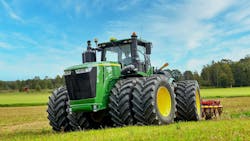A Detailed Look at IF/VF Ag Tires
There are many benefits of using increased flexion (IF) and very high-flexion (VF) tires, according to Dave Paulk, manager, field technical services, for BKT USA Inc.
The below quotes originally appeared AG Tire Talk in the February edition of MTD.
“There are definite advantages in using IF/VF tires and applications where they work and perform much better than standard tires,” he says.
“Farms are more spread out. Farmers must get their tractors and equipment from one farm to the next by driving on the road. As equipment gets heavier, IF/VF tires are useful in carrying the weight of the equipment at highway speeds. IF-rated tires are made to carry up to 20% more load at the same air pressure as a standard tire. They will carry higher loads at higher air pressures than standard tires. VF tires are made to carry 40% more load at the same air pressure as a standard tire. They can also carry heavier loads at higher air pressures.
“When transporting equipment at highway speeds, oftentimes this higher load capacity is needed to keep the tires from failing because of heat buildup and overload,” says Paulk. “Most tractors will run at least 30 mph and most sprayers will run at 40 mph. Higher air pressures are needed when transporting on the road to carry the weight and keep the tires running cooler.
“In some cases, IF or VF tires must be used because of the heavy weight of the equipment. Conversely, when used in the field, IF and VF tires can be run at less air pressure to minimize soil compaction, where no-till and minimum-till farming is concerned. They are being run at slower speeds. However, the tires must have enough air to carry the weight of the tractor and implements. Since air pressure determines ground bearing pressure, IF and VF tires can be run with 20% and 40%, respectively, less air pressure compared to a standard tire.
“By running less air pressure in the field, the radial tire has a wider and longer footprint to help spread the weight of the tractor or equipment out over a wider area. This also offers better traction and more fuel savings in the field.
“When central tire inflation systems are used, tires can be inflated for road use and deflated for field use. Low air pressures set for field use do not work on the highway. The faster a tire rolls, the less weight carrying capacity it has. Running low air pressures on the road allows tires to run hot and they don’t dissipate heat as easily. This will cause tires to eventually fail in the bead and sidewall areas. Conversely, running lower air pressures in the field will minimize soil compaction, give better traction and burn less fuel.
“Some IF and VF tires may be labeled as IF or VF-CFO (cyclic field operation) tires,” says Paulk. “CFO tires are used mainly on combines and grain carts where the loads are cyclical or changing and are not constant. At slower speeds, these tires allow load bonuses for use in the field at slower field speeds.
“IF-CFO tires allow a 70% load bonus at up to 5 mph cyclic, a 55% load bonus at up to 10 mph cyclic and a 35% load bonus at up to 20 mph cyclic. VF-CFO tires allow a 48.5% load bonus at up to 5 mph cyclic, a 35.5% load bonus at up to 10 mph cyclic and a 13.5% load bonus at up to 20 mph cyclic. At slower field speeds IF or VF-CFO-designated tires will carry a lot of weight without having to adjust air pressures.”
